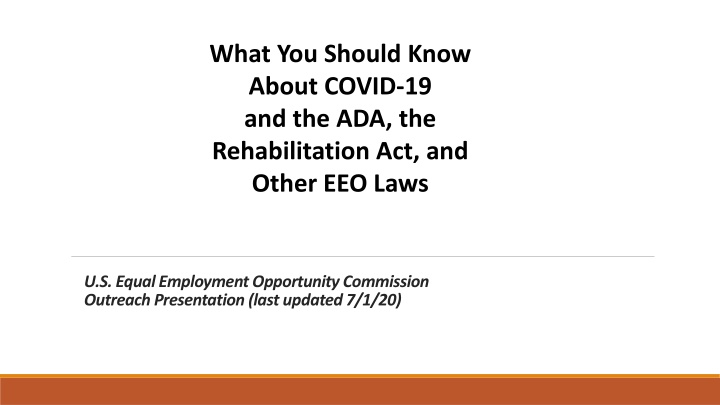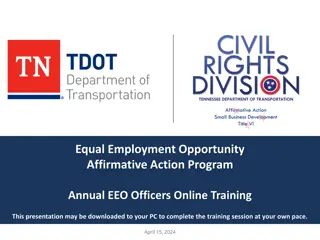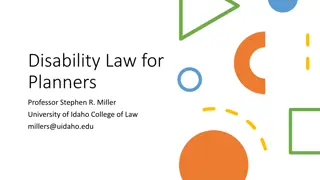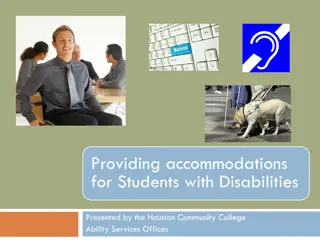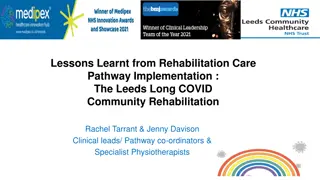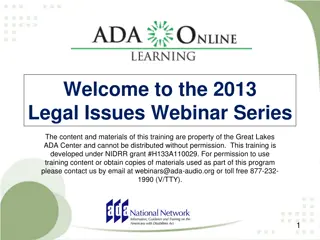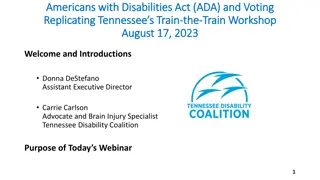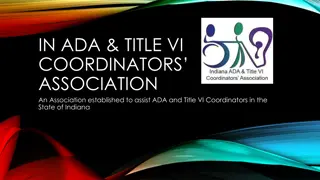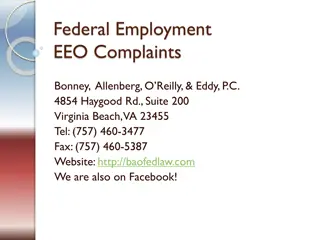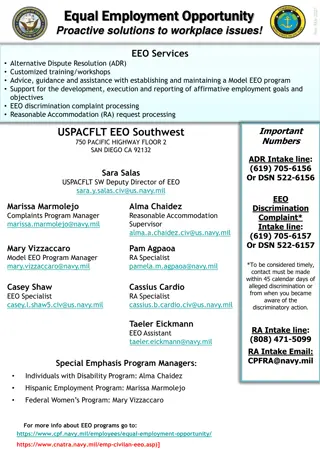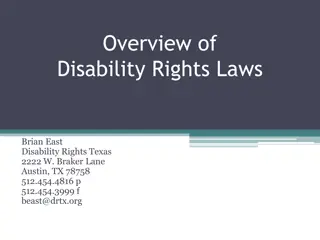COVID-19 in the Workplace: ADA, Rehabilitation Act, EEO Laws
In this comprehensive presentation by the U.S. Equal Employment Opportunity Commission, topics such as confidentiality of medical information, disability-related inquiries, furloughs, lay-offs, direct threats, and accommodations are covered. The content delves into the impact of the pandemic on employment practices, addressing critical aspects that employers and employees need to understand during these challenging times.
Download Presentation

Please find below an Image/Link to download the presentation.
The content on the website is provided AS IS for your information and personal use only. It may not be sold, licensed, or shared on other websites without obtaining consent from the author.If you encounter any issues during the download, it is possible that the publisher has removed the file from their server.
You are allowed to download the files provided on this website for personal or commercial use, subject to the condition that they are used lawfully. All files are the property of their respective owners.
The content on the website is provided AS IS for your information and personal use only. It may not be sold, licensed, or shared on other websites without obtaining consent from the author.
E N D
Presentation Transcript
What You Should Know About COVID-19 and the ADA, the Rehabilitation Act, and Other EEO Laws U.S. Equal Employment Opportunity Commission Outreach Presentation (last updated 7/1/20)
EEOC Resources EEOC Resources All EEOC resources on COVID-19: www.eeoc.gov/coronavirus. Including: COVID-19 Ask the EEOC free recorded webinar with written transcript https://www.eeoc.gov/transcript-march-27-2020-outreach-webinar What You Should Know About COVID-19 and the ADA, the Rehabilitation Act, and Other EEO Laws https://www.eeoc.gov/wysk/what-you-should-know-about-covid-19-and-ada- rehabilitation-act-and-other-eeo-laws (check here for updates) Pandemic Preparedness in the Workplace and the ADA https://www.eeoc.gov/laws/guidance/pandemic-preparedness-workplace-and- americans-disabilities-act
Topics Topics Confidentiality of Medical Information Disability-Related Inquiries and Medical Exams Furlough and Layoff Direct Threat Infection Control/Personal Protective Gear/Vaccine Requirements Hiring and Onboarding Reasonable Accommodation Disability and Religious Accommodation Harassment National Origin/ Race/Other Bases Caregivers/Family Responsibilities Pregnancy Age
Furlough and Layoff Furlough and Layoff Effect of the pandemic on economy has unfortunately resulted in many furloughs and layoffs. Remember: Special rules apply when employer offering severance package in exchange for general release from all discrimination complaints: --WYSK question F.1 No disparate treatment in layoffs or furloughs based on protected characteristic, e.g., pregnancy or older age: --3/27/20 webinar question 13
Direct Threat Direct Threat At this time, if employee physically entering workplace, Americans with Disabilities Act (ADA) allows employers to screen for & exclude those with COVID-19 or symptoms, because of direct threat posed to health of others: -- Pandemic Preparedness Section II.B and question III.B.5 and 3/27/20 webinar question 1 However, ADA does not allow employers to involuntarily exclude employee without COVID-19 or symptoms solely because of underlying disability (e.g., diabetes, heart disease, etc.) Employer would have to analyze & show that employee poses direct threat to self, a high standard to meet, and even then exclusion only allowed if no accommodation possible: -- WYSK questions G.4 and G.5
Disability Disability- -Related Inquiries Related Inquiries and Medical Exams and Medical Exams ADA allows screening of all employees for COVID-19 as long as consistent with best available objective medical evidence, e.g., recommendations of Centers for Disease Control and Prevention (CDC) and state/local public health authorities: WYSK question G.1 Employees may make requests for alternative methods of screening based on disability or religious beliefs: WYSK question G.7 Employer may bar employee from workplace for refusal to answer/be screened: 3/27/20 webinar question 2 To gain cooperation of employees, however, employers may wish to ask the reasons for the employee s refusal or remind the employee about confidentiality: 3/27/20 webinar question 2 No disparate treatment on protected basis in selecting who is screened: WYSK question G.1
Disability Disability- -Related Inquiries Related Inquiries and Medical Exams and Medical Exams Examples of employer worksite screening for COVID-19 that ADA allows at this time: questions about COVID-19 diagnosis or testing: 3/27/20 webinar question 1 questions about COVID-19 symptoms: WYSK question A.2 questions about exposure to anyone with COVID -- but Genetic Information Nondiscrimination Act (GINA) violation to ask about family members: 3/27/20 webinar question 4 questions if call in sick or feel ill at work: Pandemic Preparedness question III.B.6 taking temperature: WYSK question A.3 administering COVID-19 viral tests (but not anti-body tests) continue to check updated recommendations of CDC and other public health authorities: WYSK questions A.6-A.7 Employers may instruct employees to stay home or send them home if they have COVID-19 or symptoms:WYSK question A.4
Disability Disability- -Related Inquiries Related Inquiries and Medical Exams (cont d) and Medical Exams (cont d) If employer wishes to screen only particular employee(s) for COVID-19, ADA requires employer first to have a reasonable belief based on objective evidence that this person might have the disease:3/27/20 webinar question 3 For example, if an employer notices that an employee has a persistent, hacking cough (a symptom of COVID-19), the employer could ask about the cough, whether the employee has been to a doctor, and whether the employee knows if she has or might have COVID-19:3/27/20 webinar question 3
Disability Disability- -Related Inquiries Related Inquiries and Medical Exams (cont d) and Medical Exams (cont d) Employer may ask reason for unexplained failure to report to work: Pandemic Preparedness question III.B.15 ADA generally does not prohibit questions about employee work/personal travel: Pandemic Preparedness question III.B.8 ADA allows employer to require doctor s note for return after COVID-19 illness: WYSK question A.5 ADA allows screening job applicants for COVID- 19/symptoms if post-offer for all applicants entering same job, but not pre-offer: WYSK questions C.1 and C.2
Confidentiality of Medical Information Confidentiality of Medical Information COVID diagnosis, fact of fever, or any symptoms all subject to ADA confidentiality; documents may be placed in existing medical file: Pandemic Preparedness question III.B.7 and 3/27/20 webinar questions 5-10; WYSK question B.1 Manager may only share name of someone with COVID-19 or symptoms with other managers who have need to know, not all other managers. If informing workforce of potential exposure, employer cannot disclose name of employee but may say, for example, someone on the 4th floor, or someone in this building: 3/27/20 webinar question 5
Confidentiality of Medical Information Confidentiality of Medical Information (cont d) (cont d) Employer may tell coworkers employee is teleworking or on leave, but can t reveal reason is COVID-19/symptoms: 3/27/20 webinar question 7 Employer must not disclose name of employee with COVID-19 to workforce, but may say someone at this location, someone on the 4th Floor, or similar descriptor to notify potentially exposed coworkers: 3/27/20 webinar question 8 Managers/supervisors must keep medical information confidential even while teleworking: 3/27/20 webinar question 9
Hiring and Onboarding Hiring and Onboarding Under ADA, employer may: screen applicants for COVID-19/symptoms if done post- offer for all applicants entering same job, not pre-offer: WYSK questions C.1 and C.2 delay start date for job at worksite due to applicant COVID-19/symptoms: WYSK question C.3 withdraw offer due to applicant COVID-19/symptoms if employer needs immediate start date: WYSK question C.4
Hiring and Onboarding (contd) Hiring and Onboarding (cont d) Under Age Discrimination in Employment Act (ADEA) and Title VII as amended by Pregnancy Discrimination Act (PDA): Employer must not unilaterally postpone start date or withdraw job offer based on older age or pregnancy, even if applicant at higher risk of severe illness if contracts COVID-19: WYSK question C.5
Reasonable Accommodation Reasonable Accommodation Employee may be entitled to accommodation for pre-existing disability that places employee at higher risk of serious illness from COVID-19, or that is exacerbated by current situation created by pandemic (particularly certain mental illnesses or disorders, e.g., including anxiety disorders, obsessive-compulsive disorders, and PTSD): WYSK questions D.1., D.2., and G.5. Critical infrastructure workers and essential critical workers have the same accommodation rights as other employees: WYSK question D.12 ADA does not require accommodation of employee for association with an individual with a disability: WYSK question D.13 NOTE: EEOC has not addressed whether someone with COVID-19 is an individual with a disability under the ADA
Reasonable Accommodation (contd) Reasonable Accommodation (cont d) Possible approaches for inviting employees if they wish to request disability accommodations, or flexibilities to meet other needs, due to pandemic: WYSK question G.6 Employee still required to request accommodation: WYSK question G.3 Employer still may conduct an interactive process, including requesting medical documentation, to determine if has disability and needs accommodation: WYSK questions D.5. and D.6. COVID-19 circumstances may delay usual processing of accommodation requests: Pandemic Preparedness question III.B.14 Circumstances created by pandemic and workplace shutdown may be relevant to undue hardship: WYSK questions D.9-D.11
Reasonable Accommodation (contd) Reasonable Accommodation (cont d) Telework, leave, and reassignment may be reasonable accommodations for disabilities that require staying out of workplace: WYSK question G.4 Examples of accommodations for disabilities to allow individuals to remain in the workplace: WYSK questions D.1. and G.5 If employer recalls employee to work, continued telework need not be granted as accommodation unless ADA requirements met Employer can restore essential functions if they were temporarily altered due to mandatory telework: 3/27/20 webinar question 21 Whether telework was effective during pandemic conditions may be relevant to deciding employee s request for telework after workplace re-opens: 3/27/20 webinar question 22
Infection Control/Personal Protective Gear/Vaccine Infection Control/Personal Protective Gear/Vaccine Requirements Requirements Disability and Religious Accommodation Disability and Religious Accommodation Employer may require infection control measures (e.g., frequent handwashing) and protective gear (e.g., masks, gloves), but employees may be entitled to disability/religious accommodation: WYSK question G.2 and Pandemic Preparedness questions III.B.11 and 12 If mandatory vaccination policy, must consider disability/religious accommodation requests: Pandemic Preparedness question III.B.13
Age Age Under ADEA, which prohibits age discrimination against those age 40+, employer may not involuntarily exclude older workers based on age-related risk of more severe illness from COVID-19: WYSK question H.1 ADEA allows more favorable treatment of older workers based on age, so employers may choose to offer flexibility to older employees based on age, even if deny to younger employees over 40: WYSK question H.1
Age Age But there is no ADEA right to accommodation based on age/age-related risks from COVID-19. Older workers, however, may of course request ADA accommodation for medical conditions: WYSK question H.1 No disparate treatment based on older age if offering flexibilities to comparable workers: 3/27/20 webinar question 12
Pregnancy Pregnancy Under Title VII as amended by Pregnancy Discrimination Act (PDA), employer may not involuntarily exclude from workplace based on pregnancy, notwithstanding any possibility of any greater risk from COVID-19: WYSK question J.1 PDA s disparate treatment prohibition may require accommodation or flexibility for pregnancy where afforded others who are not pregnant but are similar in ability/inability to work: WYSK question J.2 Pregnancy not a disability under ADA, but ADA accommodation for pregnancy-related medical condition if it is disability and other ADA requirements met: WYSK question J.2
Caregivers/Family Responsibilities Caregivers/Family Responsibilities Employers may offer flexibilities such as telework, modified schedules, or other benefits to employees with caregiver/family responsibilities, but cannot engage in EEO disparate treatment. Example: Prohibited for employer to offer female employees more preferable benefits because of sex-based assumptions about who in the workforce has caregiver responsibilities: WYSK question I.1
Harassment: Harassment: National Origin/Race/Other Bases National Origin/Race/Other Bases Harassment related to COVID-19 based on national origin, race, or any other protected characteristic is prohibited: WYSK question E.1 and 3/27/20 webinar question 15 Managers should be alert to harassment involving COVID- 19, including its origins, against those who are or are perceived to be of Chinese or other Asian national origin: WYSK question E.3 Harassment may originate with contractors, customers and clients: WYSK question E.3
Harassment: National Origin/Race/ Harassment: National Origin/Race/ Other Bases Other Bases Harassment may occur whether employees are in the workplace, teleworking, or on leave, including via emails, phone calls, platforms for video or chat communication: WYSK questions E.3 and E.4 Recommended steps to prevent harassment as workplaces reopen: WYSK question E.2 Managers should know their legal obligations and employers may remind workforce of harassment prohibition and consequences: WYSK question E.3 EEOC resources/tools for employers: WYSK question E.1
Contacting the EEOC For questions about ADA and other statutes enforced by the EEOC: 202-663-4691 (EEOC Office of Legal Counsel Attorney of the Day line) 1-800-669-6820 (TTY) 1-844-234-5122 (ASL Video Phone) To file a private sector charge of discrimination, first submit inquiry: https://publicportal.eeoc.gov/Portal/Login.aspx Overview of federal sector EEO process: https://www.eeoc.gov/federal- sector/overview-federal-sector-eeo-complaint-process
Questions? Jeanne Goldberg Office of Legal Counsel U.S. Equal Employment Opportunity Commission 131 M Street, NE Washington, DC 20507 (202) 663-4693 jeanne.goldberg@eeoc.gov
